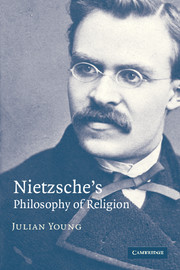Book contents
- Frontmatter
- Contents
- Acknowledgements
- List of abbreviations
- Introduction
- 1 Schopenhauer and ‘Man's Need for Metaphysics’
- 2 The Birth of Tragedy
- 3 Untimely Meditations
- 4 Human, All-too-Human
- 5 The Gay Science
- 6 Thus Spoke Zarathustra
- 7 Beyond Good and Evil
- 8 On the Genealogy of Morals
- 9 The Wagner Case
- 10 Twilight of the Idols
- 11 The Antichrist
- 12 Ecce Homo
- 13 Epilogue: Nietzsche in history
- Bibliography
- Index
11 - The Antichrist
Published online by Cambridge University Press: 27 October 2009
- Frontmatter
- Contents
- Acknowledgements
- List of abbreviations
- Introduction
- 1 Schopenhauer and ‘Man's Need for Metaphysics’
- 2 The Birth of Tragedy
- 3 Untimely Meditations
- 4 Human, All-too-Human
- 5 The Gay Science
- 6 Thus Spoke Zarathustra
- 7 Beyond Good and Evil
- 8 On the Genealogy of Morals
- 9 The Wagner Case
- 10 Twilight of the Idols
- 11 The Antichrist
- 12 Ecce Homo
- 13 Epilogue: Nietzsche in history
- Bibliography
- Index
Summary
The Antichrist was completed in September 1888, just three months before Nietzsche's mental collapse on 3 January 1890. It is full of vitriolic attacks on Christianity, most of which I shall ignore. But it is also highly informative as to his positive alternative, his views on the healthy society and the place of religion in it. That The Antichrist's ultimate purpose is constructive rather than destructive ought to come as no surprise since in the Genealogy Nietzsche has informed us that the ‘Antichrist’ is not just the ‘conqueror of God’ but represents also ‘the great health’, that is to say, the ‘redemption of … reality’ (GM ii 24).
HEALTHY VERSUS UNHEALTHY GODS
‘A people’, says Nietzsche
which still believes in itself [i.e. possesses a unifying ethos in which to believe] still also has its own god. In him it venerates the conditions through which it has prospered, [i.e. as we know from Zarathustra's ‘Thousand-and-one goals’] its virtues – it projects its joy in itself, its feeling of power, onto a being whom one can thank for them. He who is rich wants to bestow; a proud people needs a god in order to sacrifice … Within the bounds of such presuppositions religion is a form of gratitude. One is grateful for oneself: for that one needs a god. – Such a god must be able to be both useful and harmful, both friend and foe.
(A 16)- Type
- Chapter
- Information
- Nietzsche's Philosophy of Religion , pp. 177 - 189Publisher: Cambridge University PressPrint publication year: 2006



